Economics: Analysis of Trade between Individuals and Nations
VerifiedAdded on 2022/12/30
|8
|1896
|43
Essay
AI Summary
This economics essay delves into the intricacies of trade, examining both individual and international perspectives. It begins by highlighting the importance of specialization and trade, emphasizing how countries engage in commerce to fulfill their needs and exploit resources. The essay explores the winners and losers of trade, analyzing the effects of free trade on exporters, consumers, and domestic firms, while also acknowledging the potential negative impacts on uncompetitive industries and workers. It then explains comparative advantage and its role in wealth creation, stressing the importance of voluntary exchange and property rights. The second part of the essay focuses on trade between nations, discussing the advantages and disadvantages of trading with neighboring and international countries. The essay concludes by analyzing the benefits and drawbacks of international trade, including its impact on job creation, economic growth, and competitiveness, while also addressing the pros and cons of trade restrictions and their implications for domestic industries and consumers. The essay uses various sources to support its arguments, including studies on supply-chain trade, internal geography, and the effects of trade on presidential voting.

Running head: ECONOMICS
Economics
Name of the student
Name of the university
Author note
Economics
Name of the student
Name of the university
Author note
Paraphrase This Document
Need a fresh take? Get an instant paraphrase of this document with our AI Paraphraser
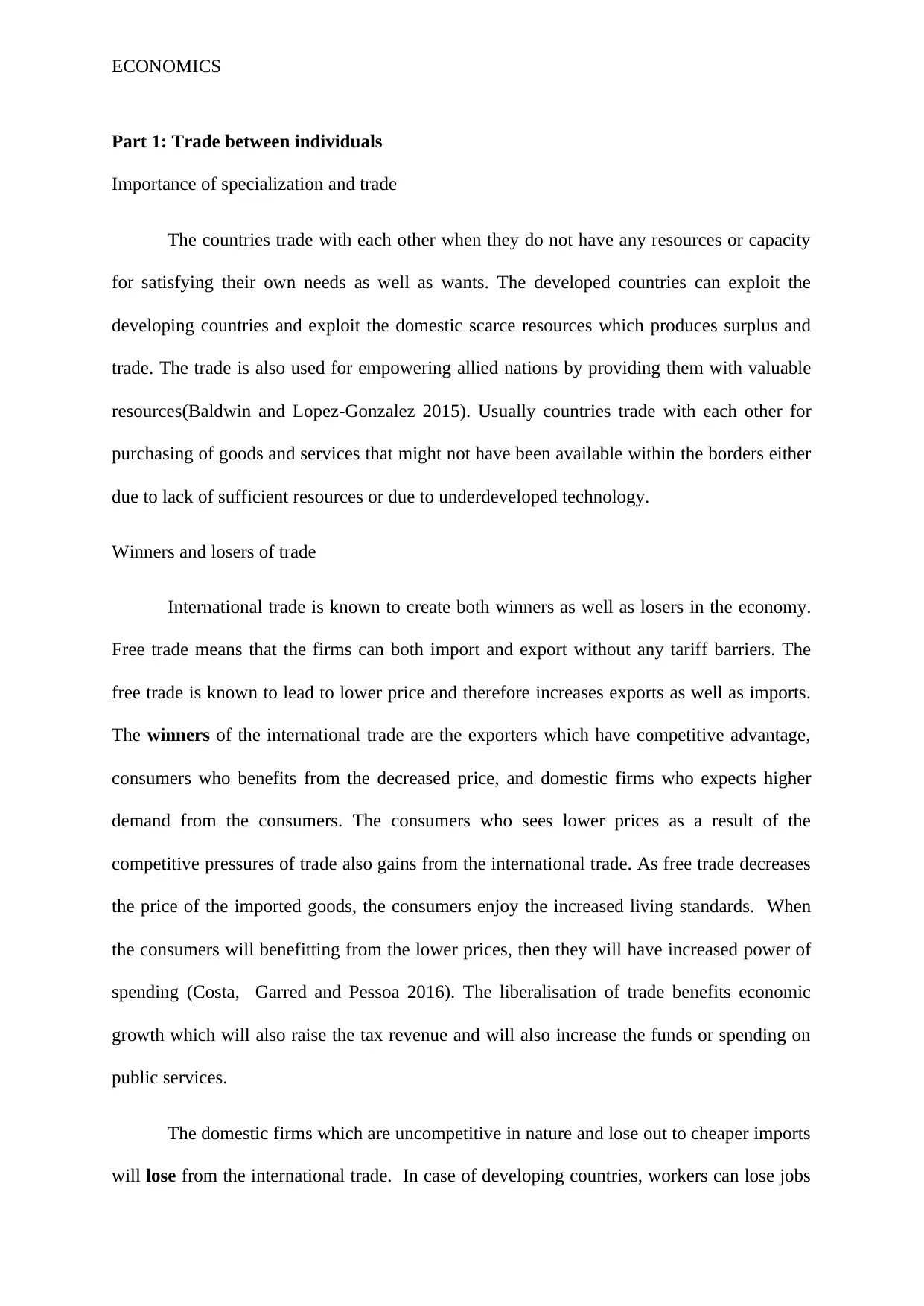
ECONOMICS
Part 1: Trade between individuals
Importance of specialization and trade
The countries trade with each other when they do not have any resources or capacity
for satisfying their own needs as well as wants. The developed countries can exploit the
developing countries and exploit the domestic scarce resources which produces surplus and
trade. The trade is also used for empowering allied nations by providing them with valuable
resources(Baldwin and Lopez‐Gonzalez 2015). Usually countries trade with each other for
purchasing of goods and services that might not have been available within the borders either
due to lack of sufficient resources or due to underdeveloped technology.
Winners and losers of trade
International trade is known to create both winners as well as losers in the economy.
Free trade means that the firms can both import and export without any tariff barriers. The
free trade is known to lead to lower price and therefore increases exports as well as imports.
The winners of the international trade are the exporters which have competitive advantage,
consumers who benefits from the decreased price, and domestic firms who expects higher
demand from the consumers. The consumers who sees lower prices as a result of the
competitive pressures of trade also gains from the international trade. As free trade decreases
the price of the imported goods, the consumers enjoy the increased living standards. When
the consumers will benefitting from the lower prices, then they will have increased power of
spending (Costa, Garred and Pessoa 2016). The liberalisation of trade benefits economic
growth which will also raise the tax revenue and will also increase the funds or spending on
public services.
The domestic firms which are uncompetitive in nature and lose out to cheaper imports
will lose from the international trade. In case of developing countries, workers can lose jobs
Part 1: Trade between individuals
Importance of specialization and trade
The countries trade with each other when they do not have any resources or capacity
for satisfying their own needs as well as wants. The developed countries can exploit the
developing countries and exploit the domestic scarce resources which produces surplus and
trade. The trade is also used for empowering allied nations by providing them with valuable
resources(Baldwin and Lopez‐Gonzalez 2015). Usually countries trade with each other for
purchasing of goods and services that might not have been available within the borders either
due to lack of sufficient resources or due to underdeveloped technology.
Winners and losers of trade
International trade is known to create both winners as well as losers in the economy.
Free trade means that the firms can both import and export without any tariff barriers. The
free trade is known to lead to lower price and therefore increases exports as well as imports.
The winners of the international trade are the exporters which have competitive advantage,
consumers who benefits from the decreased price, and domestic firms who expects higher
demand from the consumers. The consumers who sees lower prices as a result of the
competitive pressures of trade also gains from the international trade. As free trade decreases
the price of the imported goods, the consumers enjoy the increased living standards. When
the consumers will benefitting from the lower prices, then they will have increased power of
spending (Costa, Garred and Pessoa 2016). The liberalisation of trade benefits economic
growth which will also raise the tax revenue and will also increase the funds or spending on
public services.
The domestic firms which are uncompetitive in nature and lose out to cheaper imports
will lose from the international trade. In case of developing countries, workers can lose jobs
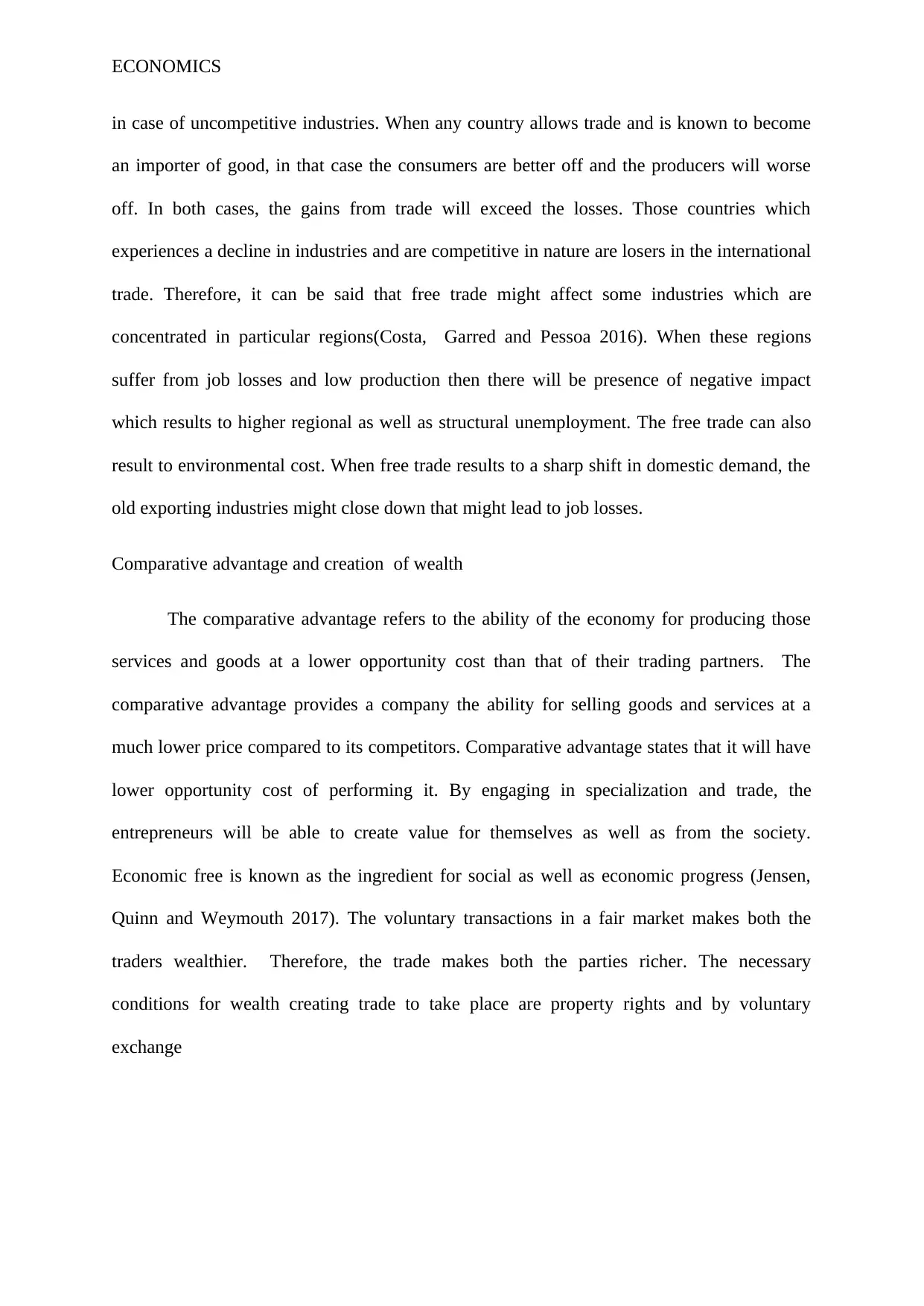
ECONOMICS
in case of uncompetitive industries. When any country allows trade and is known to become
an importer of good, in that case the consumers are better off and the producers will worse
off. In both cases, the gains from trade will exceed the losses. Those countries which
experiences a decline in industries and are competitive in nature are losers in the international
trade. Therefore, it can be said that free trade might affect some industries which are
concentrated in particular regions(Costa, Garred and Pessoa 2016). When these regions
suffer from job losses and low production then there will be presence of negative impact
which results to higher regional as well as structural unemployment. The free trade can also
result to environmental cost. When free trade results to a sharp shift in domestic demand, the
old exporting industries might close down that might lead to job losses.
Comparative advantage and creation of wealth
The comparative advantage refers to the ability of the economy for producing those
services and goods at a lower opportunity cost than that of their trading partners. The
comparative advantage provides a company the ability for selling goods and services at a
much lower price compared to its competitors. Comparative advantage states that it will have
lower opportunity cost of performing it. By engaging in specialization and trade, the
entrepreneurs will be able to create value for themselves as well as from the society.
Economic free is known as the ingredient for social as well as economic progress (Jensen,
Quinn and Weymouth 2017). The voluntary transactions in a fair market makes both the
traders wealthier. Therefore, the trade makes both the parties richer. The necessary
conditions for wealth creating trade to take place are property rights and by voluntary
exchange
in case of uncompetitive industries. When any country allows trade and is known to become
an importer of good, in that case the consumers are better off and the producers will worse
off. In both cases, the gains from trade will exceed the losses. Those countries which
experiences a decline in industries and are competitive in nature are losers in the international
trade. Therefore, it can be said that free trade might affect some industries which are
concentrated in particular regions(Costa, Garred and Pessoa 2016). When these regions
suffer from job losses and low production then there will be presence of negative impact
which results to higher regional as well as structural unemployment. The free trade can also
result to environmental cost. When free trade results to a sharp shift in domestic demand, the
old exporting industries might close down that might lead to job losses.
Comparative advantage and creation of wealth
The comparative advantage refers to the ability of the economy for producing those
services and goods at a lower opportunity cost than that of their trading partners. The
comparative advantage provides a company the ability for selling goods and services at a
much lower price compared to its competitors. Comparative advantage states that it will have
lower opportunity cost of performing it. By engaging in specialization and trade, the
entrepreneurs will be able to create value for themselves as well as from the society.
Economic free is known as the ingredient for social as well as economic progress (Jensen,
Quinn and Weymouth 2017). The voluntary transactions in a fair market makes both the
traders wealthier. Therefore, the trade makes both the parties richer. The necessary
conditions for wealth creating trade to take place are property rights and by voluntary
exchange
⊘ This is a preview!⊘
Do you want full access?
Subscribe today to unlock all pages.

Trusted by 1+ million students worldwide
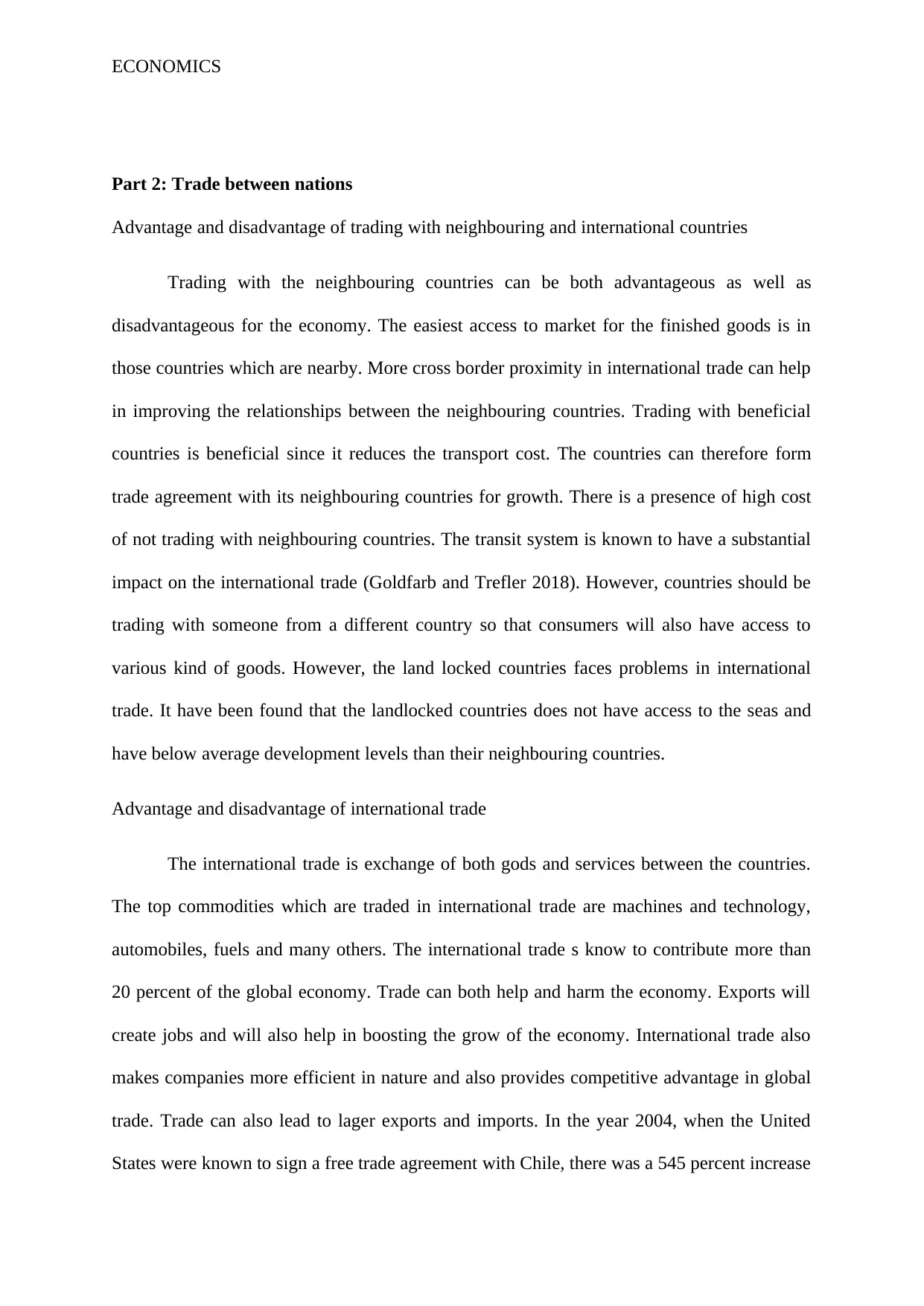
ECONOMICS
Part 2: Trade between nations
Advantage and disadvantage of trading with neighbouring and international countries
Trading with the neighbouring countries can be both advantageous as well as
disadvantageous for the economy. The easiest access to market for the finished goods is in
those countries which are nearby. More cross border proximity in international trade can help
in improving the relationships between the neighbouring countries. Trading with beneficial
countries is beneficial since it reduces the transport cost. The countries can therefore form
trade agreement with its neighbouring countries for growth. There is a presence of high cost
of not trading with neighbouring countries. The transit system is known to have a substantial
impact on the international trade (Goldfarb and Trefler 2018). However, countries should be
trading with someone from a different country so that consumers will also have access to
various kind of goods. However, the land locked countries faces problems in international
trade. It have been found that the landlocked countries does not have access to the seas and
have below average development levels than their neighbouring countries.
Advantage and disadvantage of international trade
The international trade is exchange of both gods and services between the countries.
The top commodities which are traded in international trade are machines and technology,
automobiles, fuels and many others. The international trade s know to contribute more than
20 percent of the global economy. Trade can both help and harm the economy. Exports will
create jobs and will also help in boosting the grow of the economy. International trade also
makes companies more efficient in nature and also provides competitive advantage in global
trade. Trade can also lead to lager exports and imports. In the year 2004, when the United
States were known to sign a free trade agreement with Chile, there was a 545 percent increase
Part 2: Trade between nations
Advantage and disadvantage of trading with neighbouring and international countries
Trading with the neighbouring countries can be both advantageous as well as
disadvantageous for the economy. The easiest access to market for the finished goods is in
those countries which are nearby. More cross border proximity in international trade can help
in improving the relationships between the neighbouring countries. Trading with beneficial
countries is beneficial since it reduces the transport cost. The countries can therefore form
trade agreement with its neighbouring countries for growth. There is a presence of high cost
of not trading with neighbouring countries. The transit system is known to have a substantial
impact on the international trade (Goldfarb and Trefler 2018). However, countries should be
trading with someone from a different country so that consumers will also have access to
various kind of goods. However, the land locked countries faces problems in international
trade. It have been found that the landlocked countries does not have access to the seas and
have below average development levels than their neighbouring countries.
Advantage and disadvantage of international trade
The international trade is exchange of both gods and services between the countries.
The top commodities which are traded in international trade are machines and technology,
automobiles, fuels and many others. The international trade s know to contribute more than
20 percent of the global economy. Trade can both help and harm the economy. Exports will
create jobs and will also help in boosting the grow of the economy. International trade also
makes companies more efficient in nature and also provides competitive advantage in global
trade. Trade can also lead to lager exports and imports. In the year 2004, when the United
States were known to sign a free trade agreement with Chile, there was a 545 percent increase
Paraphrase This Document
Need a fresh take? Get an instant paraphrase of this document with our AI Paraphraser
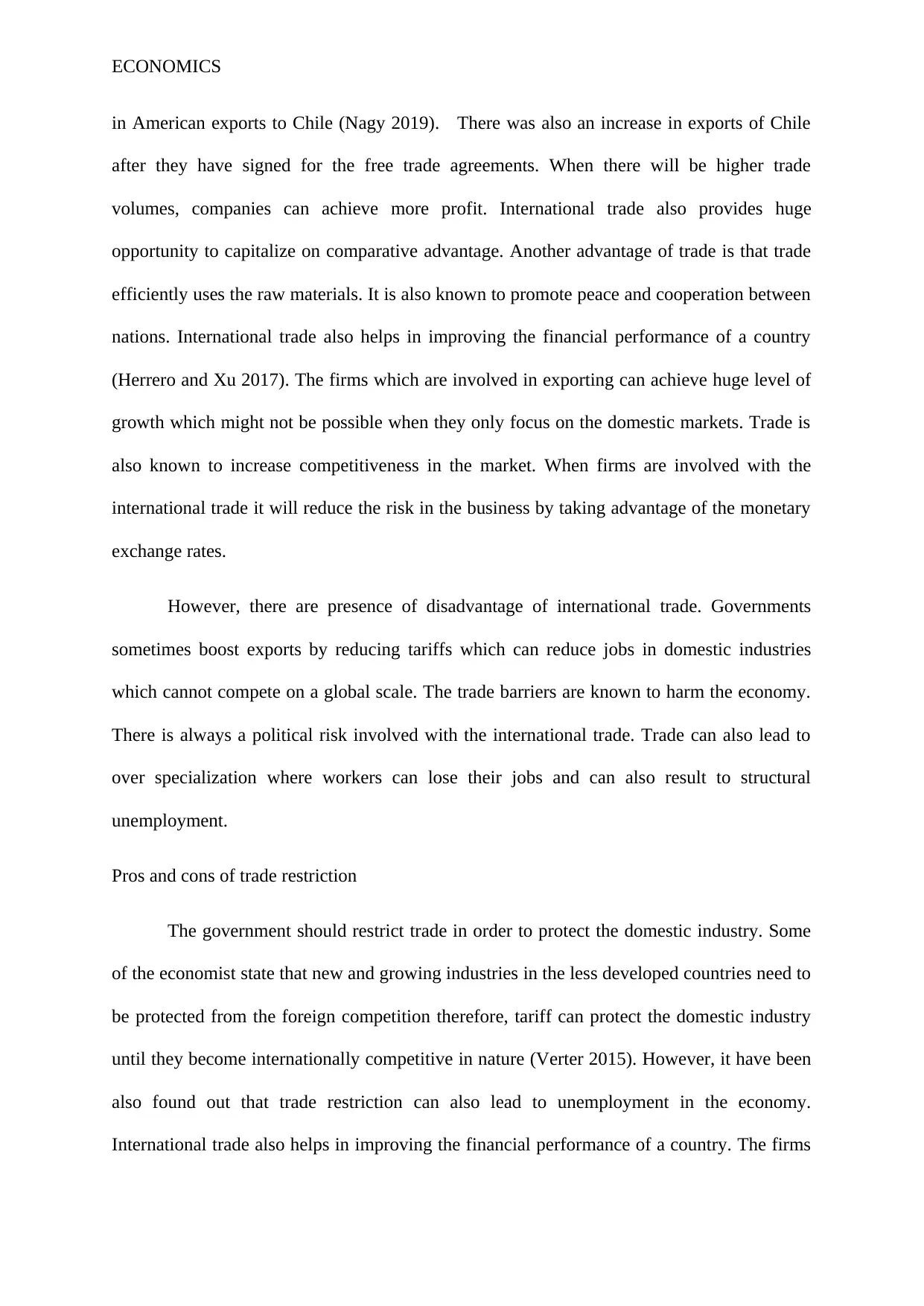
ECONOMICS
in American exports to Chile (Nagy 2019). There was also an increase in exports of Chile
after they have signed for the free trade agreements. When there will be higher trade
volumes, companies can achieve more profit. International trade also provides huge
opportunity to capitalize on comparative advantage. Another advantage of trade is that trade
efficiently uses the raw materials. It is also known to promote peace and cooperation between
nations. International trade also helps in improving the financial performance of a country
(Herrero and Xu 2017). The firms which are involved in exporting can achieve huge level of
growth which might not be possible when they only focus on the domestic markets. Trade is
also known to increase competitiveness in the market. When firms are involved with the
international trade it will reduce the risk in the business by taking advantage of the monetary
exchange rates.
However, there are presence of disadvantage of international trade. Governments
sometimes boost exports by reducing tariffs which can reduce jobs in domestic industries
which cannot compete on a global scale. The trade barriers are known to harm the economy.
There is always a political risk involved with the international trade. Trade can also lead to
over specialization where workers can lose their jobs and can also result to structural
unemployment.
Pros and cons of trade restriction
The government should restrict trade in order to protect the domestic industry. Some
of the economist state that new and growing industries in the less developed countries need to
be protected from the foreign competition therefore, tariff can protect the domestic industry
until they become internationally competitive in nature (Verter 2015). However, it have been
also found out that trade restriction can also lead to unemployment in the economy.
International trade also helps in improving the financial performance of a country. The firms
in American exports to Chile (Nagy 2019). There was also an increase in exports of Chile
after they have signed for the free trade agreements. When there will be higher trade
volumes, companies can achieve more profit. International trade also provides huge
opportunity to capitalize on comparative advantage. Another advantage of trade is that trade
efficiently uses the raw materials. It is also known to promote peace and cooperation between
nations. International trade also helps in improving the financial performance of a country
(Herrero and Xu 2017). The firms which are involved in exporting can achieve huge level of
growth which might not be possible when they only focus on the domestic markets. Trade is
also known to increase competitiveness in the market. When firms are involved with the
international trade it will reduce the risk in the business by taking advantage of the monetary
exchange rates.
However, there are presence of disadvantage of international trade. Governments
sometimes boost exports by reducing tariffs which can reduce jobs in domestic industries
which cannot compete on a global scale. The trade barriers are known to harm the economy.
There is always a political risk involved with the international trade. Trade can also lead to
over specialization where workers can lose their jobs and can also result to structural
unemployment.
Pros and cons of trade restriction
The government should restrict trade in order to protect the domestic industry. Some
of the economist state that new and growing industries in the less developed countries need to
be protected from the foreign competition therefore, tariff can protect the domestic industry
until they become internationally competitive in nature (Verter 2015). However, it have been
also found out that trade restriction can also lead to unemployment in the economy.
International trade also helps in improving the financial performance of a country. The firms
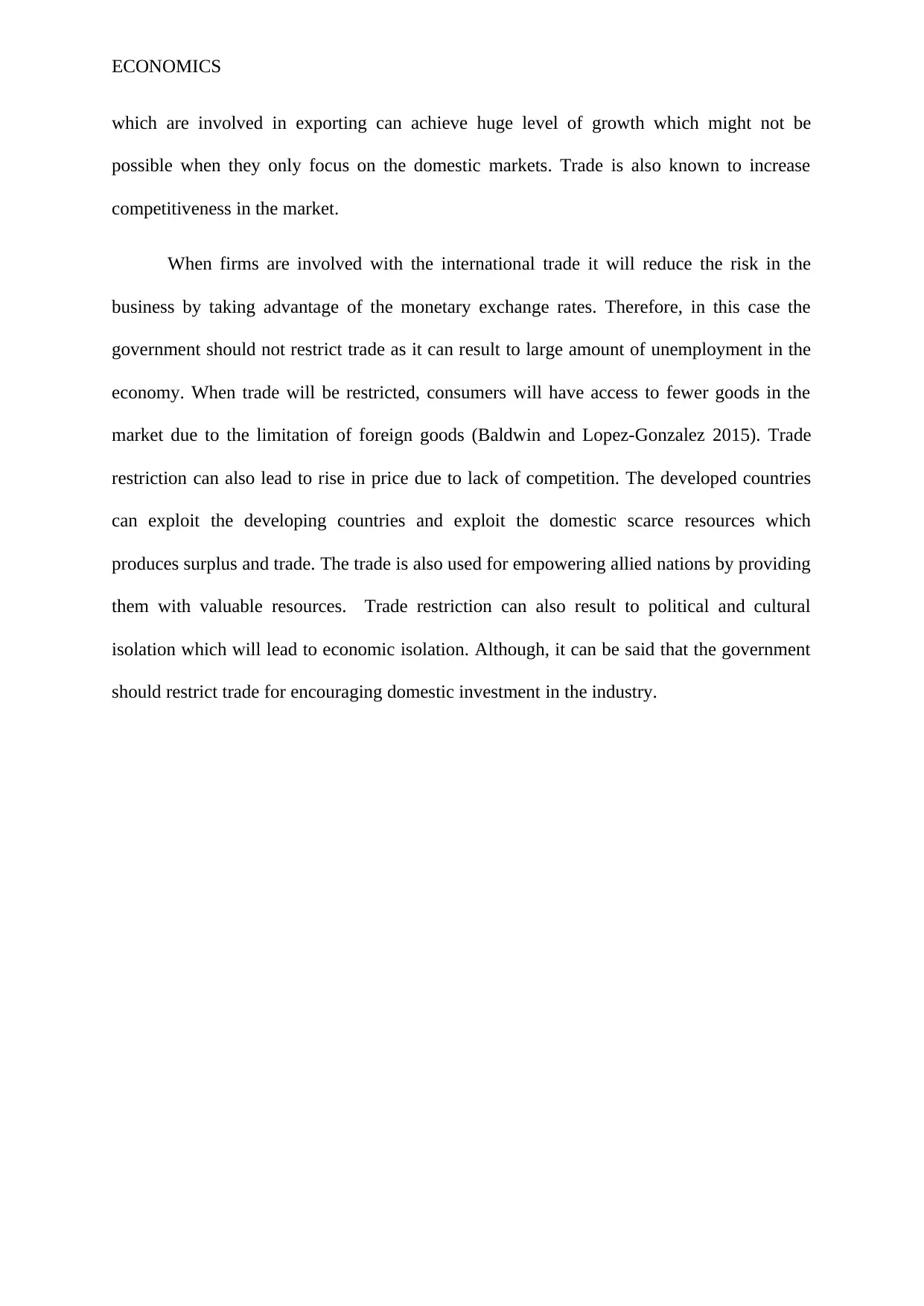
ECONOMICS
which are involved in exporting can achieve huge level of growth which might not be
possible when they only focus on the domestic markets. Trade is also known to increase
competitiveness in the market.
When firms are involved with the international trade it will reduce the risk in the
business by taking advantage of the monetary exchange rates. Therefore, in this case the
government should not restrict trade as it can result to large amount of unemployment in the
economy. When trade will be restricted, consumers will have access to fewer goods in the
market due to the limitation of foreign goods (Baldwin and Lopez‐Gonzalez 2015). Trade
restriction can also lead to rise in price due to lack of competition. The developed countries
can exploit the developing countries and exploit the domestic scarce resources which
produces surplus and trade. The trade is also used for empowering allied nations by providing
them with valuable resources. Trade restriction can also result to political and cultural
isolation which will lead to economic isolation. Although, it can be said that the government
should restrict trade for encouraging domestic investment in the industry.
which are involved in exporting can achieve huge level of growth which might not be
possible when they only focus on the domestic markets. Trade is also known to increase
competitiveness in the market.
When firms are involved with the international trade it will reduce the risk in the
business by taking advantage of the monetary exchange rates. Therefore, in this case the
government should not restrict trade as it can result to large amount of unemployment in the
economy. When trade will be restricted, consumers will have access to fewer goods in the
market due to the limitation of foreign goods (Baldwin and Lopez‐Gonzalez 2015). Trade
restriction can also lead to rise in price due to lack of competition. The developed countries
can exploit the developing countries and exploit the domestic scarce resources which
produces surplus and trade. The trade is also used for empowering allied nations by providing
them with valuable resources. Trade restriction can also result to political and cultural
isolation which will lead to economic isolation. Although, it can be said that the government
should restrict trade for encouraging domestic investment in the industry.
⊘ This is a preview!⊘
Do you want full access?
Subscribe today to unlock all pages.

Trusted by 1+ million students worldwide
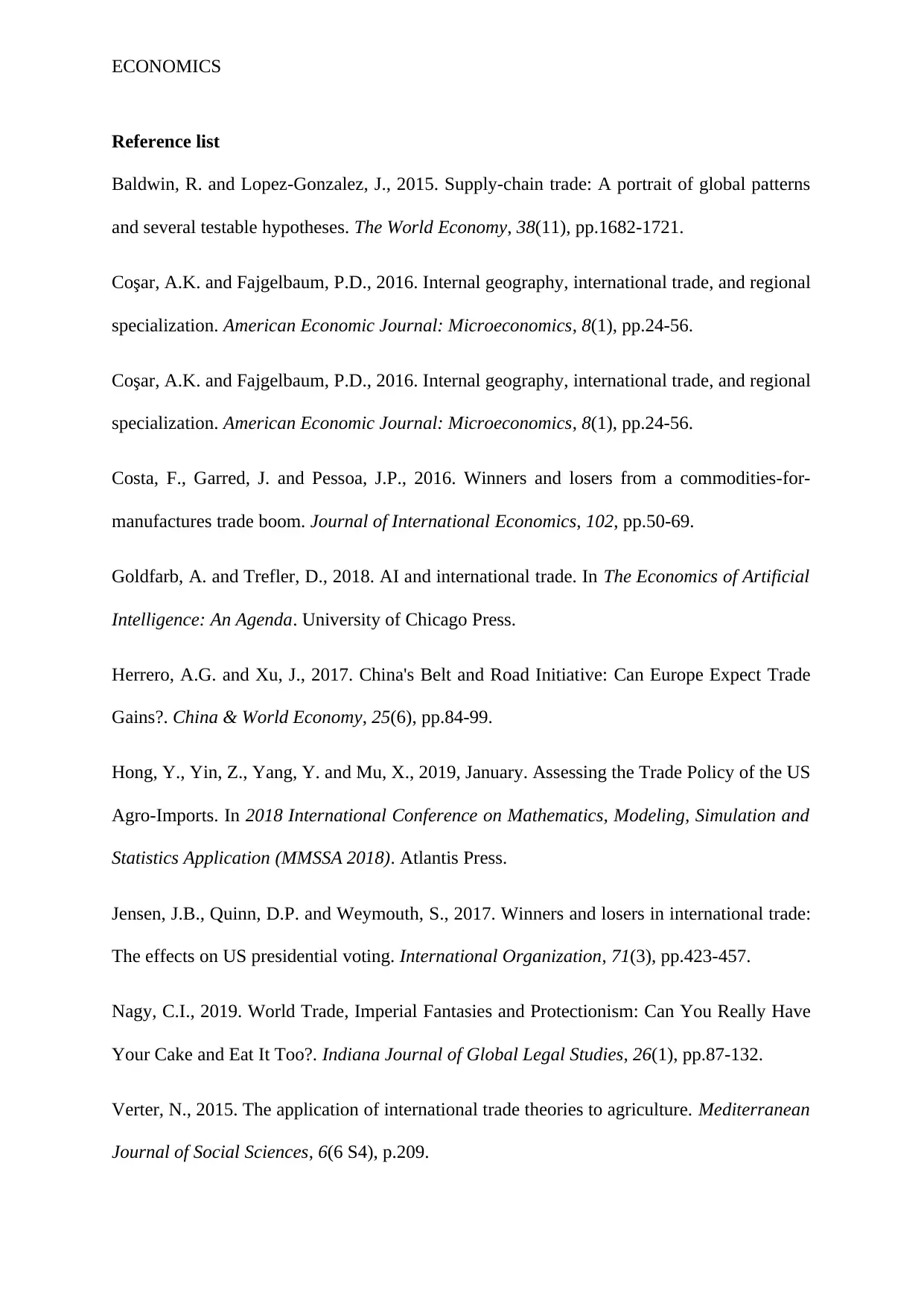
ECONOMICS
Reference list
Baldwin, R. and Lopez‐Gonzalez, J., 2015. Supply‐chain trade: A portrait of global patterns
and several testable hypotheses. The World Economy, 38(11), pp.1682-1721.
Coşar, A.K. and Fajgelbaum, P.D., 2016. Internal geography, international trade, and regional
specialization. American Economic Journal: Microeconomics, 8(1), pp.24-56.
Coşar, A.K. and Fajgelbaum, P.D., 2016. Internal geography, international trade, and regional
specialization. American Economic Journal: Microeconomics, 8(1), pp.24-56.
Costa, F., Garred, J. and Pessoa, J.P., 2016. Winners and losers from a commodities-for-
manufactures trade boom. Journal of International Economics, 102, pp.50-69.
Goldfarb, A. and Trefler, D., 2018. AI and international trade. In The Economics of Artificial
Intelligence: An Agenda. University of Chicago Press.
Herrero, A.G. and Xu, J., 2017. China's Belt and Road Initiative: Can Europe Expect Trade
Gains?. China & World Economy, 25(6), pp.84-99.
Hong, Y., Yin, Z., Yang, Y. and Mu, X., 2019, January. Assessing the Trade Policy of the US
Agro-Imports. In 2018 International Conference on Mathematics, Modeling, Simulation and
Statistics Application (MMSSA 2018). Atlantis Press.
Jensen, J.B., Quinn, D.P. and Weymouth, S., 2017. Winners and losers in international trade:
The effects on US presidential voting. International Organization, 71(3), pp.423-457.
Nagy, C.I., 2019. World Trade, Imperial Fantasies and Protectionism: Can You Really Have
Your Cake and Eat It Too?. Indiana Journal of Global Legal Studies, 26(1), pp.87-132.
Verter, N., 2015. The application of international trade theories to agriculture. Mediterranean
Journal of Social Sciences, 6(6 S4), p.209.
Reference list
Baldwin, R. and Lopez‐Gonzalez, J., 2015. Supply‐chain trade: A portrait of global patterns
and several testable hypotheses. The World Economy, 38(11), pp.1682-1721.
Coşar, A.K. and Fajgelbaum, P.D., 2016. Internal geography, international trade, and regional
specialization. American Economic Journal: Microeconomics, 8(1), pp.24-56.
Coşar, A.K. and Fajgelbaum, P.D., 2016. Internal geography, international trade, and regional
specialization. American Economic Journal: Microeconomics, 8(1), pp.24-56.
Costa, F., Garred, J. and Pessoa, J.P., 2016. Winners and losers from a commodities-for-
manufactures trade boom. Journal of International Economics, 102, pp.50-69.
Goldfarb, A. and Trefler, D., 2018. AI and international trade. In The Economics of Artificial
Intelligence: An Agenda. University of Chicago Press.
Herrero, A.G. and Xu, J., 2017. China's Belt and Road Initiative: Can Europe Expect Trade
Gains?. China & World Economy, 25(6), pp.84-99.
Hong, Y., Yin, Z., Yang, Y. and Mu, X., 2019, January. Assessing the Trade Policy of the US
Agro-Imports. In 2018 International Conference on Mathematics, Modeling, Simulation and
Statistics Application (MMSSA 2018). Atlantis Press.
Jensen, J.B., Quinn, D.P. and Weymouth, S., 2017. Winners and losers in international trade:
The effects on US presidential voting. International Organization, 71(3), pp.423-457.
Nagy, C.I., 2019. World Trade, Imperial Fantasies and Protectionism: Can You Really Have
Your Cake and Eat It Too?. Indiana Journal of Global Legal Studies, 26(1), pp.87-132.
Verter, N., 2015. The application of international trade theories to agriculture. Mediterranean
Journal of Social Sciences, 6(6 S4), p.209.
Paraphrase This Document
Need a fresh take? Get an instant paraphrase of this document with our AI Paraphraser

ECONOMICS
1 out of 8
Related Documents
Your All-in-One AI-Powered Toolkit for Academic Success.
+13062052269
info@desklib.com
Available 24*7 on WhatsApp / Email
![[object Object]](/_next/static/media/star-bottom.7253800d.svg)
Unlock your academic potential
Copyright © 2020–2026 A2Z Services. All Rights Reserved. Developed and managed by ZUCOL.




